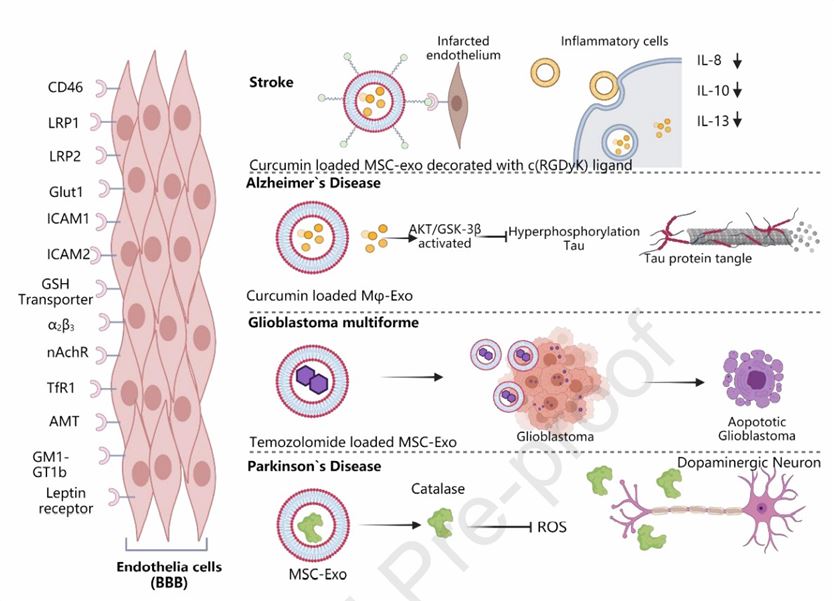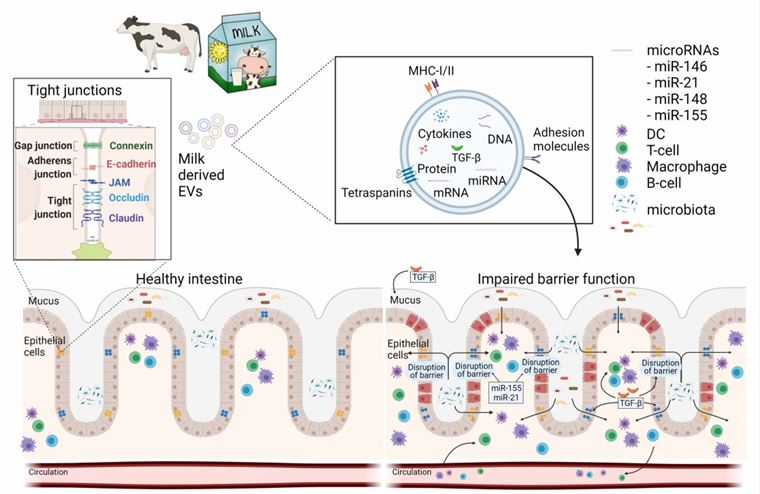Exosome Carrier-enhanced Crossing of Biological Barriers Advance Summary
Exosomes have emerged as potential carriers for therapeutics due to their surface with multiple adhesion proteins. The nanometer size and flexibility allow exosomes to cross major biological barriers, including the BBB (blood-brain barrier) and the GI tract (Gastrointestinal tract). Strategies that have been developed to enhance exosomes to overcome biological barriers offer the potential to expand the effectiveness of drug therapy. Creative Biolabs has accumulated cutting-edge insights into exosome crossing of biological barriers and provides research services related to exosome targeting.
Exosome Enhanced Crossing of BBB
BBB limits most of the brain-targeted drug delivery and thus impairs the effective treatment of neurological diseases. Depending on specific components, exosomes can achieve natural brain targeting by binding to receptor cells of different physiological states. BBB penetration by specific binding of exosomal surface ligands to brain endothelial cell receptors is currently the main mechanism of action of natural exosomes across the BBB. Macrophage-derived exosomes cross the BBB through the interaction between the integrin lymphocyte-associated antigen-1 and the BBB intercellular adhesion molecule-1.
Blood-generated exosomes with the help of transferrin receptors also exhibit natural brain-targeting functions. The cluster of differentiation 46 is the main receptor for BBB cells to capture exosomes from brain metastatic cancer cells. In addition to selecting exosome-producing cells with natural brain-targeting properties, the ability to cross the BBB is also facilitated by increasing the targeting and local concentration of exosomes at the site of brain lesions. It is achieved by the surface presentation of brain-targeting peptides, including modified RVG peptides that interact with nicotinic acetylcholine receptors and c(RGDyK) peptides that target integrin αvβ3. In addition, exosome delivery via nasal administration, based on a well-defined nasal-brain pathway, through the trigeminal or olfactory nerve pathways, is an alternative non-invasive brain-targeting delivery approach.
 Fig.1 Selected examples of exosome role as therapeutic vehicles, highlighting BBB traversal and major defined transportation receptors. (Rehman, 2022)
Fig.1 Selected examples of exosome role as therapeutic vehicles, highlighting BBB traversal and major defined transportation receptors. (Rehman, 2022)
Exosome Enhanced Crossing of GI tract
The multi-layered gastrointestinal tract acts as another biological barrier to prevent harmful substances in the intestine such as bacteria and toxins from crossing the intestinal mucosa into other tissues, organs, and blood circulation. However, the delivery of drugs targeting gastrointestinal diseases is also limited, resulting in low absorption efficiency and bioavailability. Food-derived exosomes have been developed to overcome the intestinal barrier and exhibit enhanced delivery to the digestive system, including edible plant sources and milk sources. For example, grape-derived exosomes were found to be able to evade hydrolysis by digestive enzymes and exert efficacy in relieving colitis. Milk-derived exosomes have also been shown to tolerate the gastric acid environment and be taken up by human intestinal cells, thereby improving intestinal barrier function. More notably, these food-derived exosomes protect drugs from crossing the intestinal epithelial barrier as intact particles, expanding their application as convenient oral drug carriers.
 Fig.2 Schematic overview of how milk EVs can modulate intestinal barrier function and immunity. (Aarts, 2021)
Fig.2 Schematic overview of how milk EVs can modulate intestinal barrier function and immunity. (Aarts, 2021)
The research and development of enhanced strategies for exosomes to overcome biological barriers have bridged the deficiency of delivery vehicles for exosomes targeting the brain and gastrointestinal tract, enhancing the bioavailability and application potential of therapeutic drugs. Creative Biolabs with a sophisticated technology platform provides research services for exosome exosome manufacturing and exosome targeting associated with the enhanced crossing of biological barriers. Please contact us for further information.
References
-
Rehman, F.U.; et al. Exosomes based strategies for brain drug delivery. Biomaterials. 2022, 293: 121949.
-
Aarts, J.; et al. Flood control: how milk-derived extracellular vesicles can help to improve the intestinal barrier function and break the gut-joint axis in rheumatoid arthritis. Front Immunol. 2021, 12: 703277.
For Research Use Only. Cannot be used by patients.
Related Services:

 Fig.1 Selected examples of exosome role as therapeutic vehicles, highlighting BBB traversal and major defined transportation receptors. (Rehman, 2022)
Fig.1 Selected examples of exosome role as therapeutic vehicles, highlighting BBB traversal and major defined transportation receptors. (Rehman, 2022)
 Fig.2 Schematic overview of how milk EVs can modulate intestinal barrier function and immunity. (Aarts, 2021)
Fig.2 Schematic overview of how milk EVs can modulate intestinal barrier function and immunity. (Aarts, 2021)









